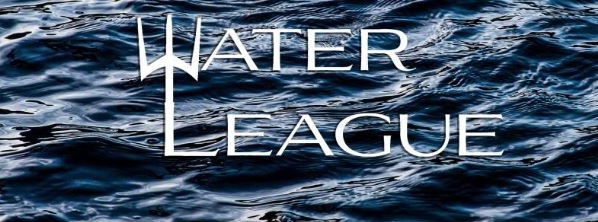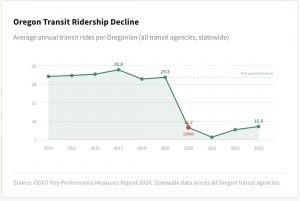Democratize Oregon water law with Water League
8 min read
With modernization of our water law stalled, a Cave Junction nonprofit encourages 4.2 million Oregonians to get involved. At the Roseburg Library Oct. 26:
Christopher Hall (Water League, executive director): My name is Christopher Hall.
The 2025 legislative session, originally back in May, was billed as a major reformation modernization of the water code. Gov. Kotek—big three cheers to Gov. Kotek—she wanted and has said she wants to modernize the water code and she had her staff pull together four esteemed water use attorneys who really understand the law. And they put their heads together, they looked at about a dozen previous reports and pulled together six important priorities and presented them back in May before the House and Senate committees. And there was a lot of good feeling about, ‘Yeah, we need to do this. We need to fix the problems.’
[00:00:58] And since then it’s been a black hole and very little information has come out about what’s going on. And there is a big question, is whether or not this is ever going to really happen.
[00:01:08] Excuses are being made: ‘We don’t have enough money. We can’t afford to modernize our water code,’ which on its face is just what always happens. You just say you don’t have the money for it. ‘Sorry, we’re not having Christmas this year.’
[00:01:24] We as the people must ensure that changes that benefit the entire public and the flora and the fauna in the present and the future will occur. That’s what it means to engage the public in water stewardship.
[00:01:37] That’s what it means to get involved, 4.2 million Oregonians to get involved in their management and governance of water. And you know, we practiced for 150 years of letting just a few thousand people take control of everything and it’s been an abject failure. It hasn’t worked. The experiment should be done and over.
[00:01:54] We need to democratize water use and water quality and water policies in the state of Oregon.
[00:02:02] We ask: Will officials reform the laws so that water use is both in the public interest of the present and the future? Officials need to modernize not just the water code, but their political culture, their thinking, and how they value water.
[00:02:17] What needs to be fixed before anything else are the ideologies and the ideas that got us into this place. As the famous saying goes: ‘Our best thinking got us where we are today.’ We need to change our thinking.
[00:02:33] John Q: Christopher Hall of Water League encourages you to get involved with water stewardship.
[00:02:38] Christopher Hall: Water League engages the public in water stewardship on various topics. One is water use and water quality. Another is equitable access to water, conservation of water for posterity, for future generations, preferring and prioritizing the highest and best uses, especially since we’re starting to run out.
[00:03:01] And the public trust doctrine, which goes back, well, so among the West Europeans, it goes back 2,000 years. With Indigenous people, it goes back since time immemorial. What that means is that our leaders and everyone, including ourselves, hold water in trust and we hold water in trust so that we can ensure that water will be there, fresh, clean, and pure, not just today, again for the future.
[00:03:29] At Water League, we hold ‘biospheric values,’ the value of recognizing that each of us is the closest to nature we will ever get. It is that our bodies are the closest to water that will ever be. And ‘biospheric values’ is caring for how we act as a valued element and emanation of nature. It is being connected with nature and not referring it to this thing out there called ‘The Wild.’
[00:03:59] We believe how we treat water is how we treat ourselves and it’s how we treat each other. We invite all to get in league with water, which is getting in league with each other, building community through water. And that is a lovely way to make connections with all of our relatives that we have learned: the flora, the fauna, the humans, the mountains, rivers, glades, meadows and aquifers, all together as a community, and all of these communities live in watersheds or basins.
[00:04:33] And I just want to remind us that if we are water, and if water is part of our family, then maybe we should consider: What does it mean to use water? Because we don’t use our friends—that’s kind of sociopathic—and we don’t exploit or extract from people. And so, when we do that to water, we’re really doing that to ourselves.
[00:04:54] John Q: The nation has changed since Thomas Jefferson expressed his agrarian vision of self-governing farmers. Most of the farmers are gone.
[00:05:03] Christopher Hall: In 1790, farmers comprised 90% of the population. And in 1850, that number dropped to 64%. By 1900, it dropped to 38%. By 1940, it dropped to 18%. By 1990, it dropped to 2.6% and today it is 1% of the population.
[00:05:25] We live in what I consider a post-agrarian society with 99% of the population conducting other business, departing far from the Thomas Jeffersonian notion of a beautiful agrarian society. Farm consolidation has mainly resulted in what we call agribusiness.
[00:05:42] Indeed, given the industrial structure of agriculture, which has resulted from this intense consolidation, Jefferson wouldn’t recognize the vast majority of food production as farming activity. Rather, he would refer to it as manufacturing.
[00:05:58] Oregon Revised Statutes 536.310 says it is in the public interest …that water use must be for economic purposes, yet we know that there are so many other actual real purposes for water. So if water equals money, then is it just like gold? Is it like oil? Because we value water as an economic resource to extract and mine for financial value, it appears as if we will stop at nothing to extract water.
[00:06:32] What happens when we mine the land of its water and determine that there is nothing left that’s worth extracting? Just as a gold miner determines the last few grains of gold aren’t worth all that digging. So what’s going to happen when we mine the land of its water and determine that there is nothing left worth extracting?
[00:06:54] When we extract water from land, we drain its life force. If you extract the water from me, I’d just become a piece of beef jerky. We know that water animates life. It does so for land. We know that there are groundwater-dependent ecosystems. There are trees.
[00:07:12] When an aquifer is drained below the root zones of trees, they die. When the water levels keep dropping, domestic wells fail. All along, groundwater-dependent ecosystems suffer as the water levels are dropping. How many shallow lakes, marshes, and wetlands have dried up that service the Pacific Flyway, that is one of the most important bird migration pathways in the world?
[00:07:41] Some scientists say that the amount of life that is subterranean is far greater than what’s above the earth, the terrestrial aquatic and birds and so forth. All water animates life. Our policies ignore this obvious fact, or worse, extract the value of life in a short-sighted, short-term effort for temporary gain.
[00:08:08] Again, it’s just like the gold rush, but we’re living in a society that is the water rush. And we actually are living in a society that is a rush of so many other things, and that we must be more mindful of, we argue.
[00:08:24] If water is life, and we believe water is life, then it appears that we may be extracting ourselves. Worse, we are foreclosing on the future and extracting the lives of those yet to come. We believe that we are in a conflict with our future selves.
[00:08:43] The public of the future is at risk. The environmental health of the ecosystem we all rely upon for survival is at risk. Harming the ecosystem is like eating the seed corn. In less than 200 years we have severely harmed our water sources and the problem is worsening.
[00:09:03] I am not saying anything new. We know that we are fighting the future with its hands tied behind its back. Our descendants are the quintessential silent majority with no voice. They cannot join us here and stand up for themselves. Will our great-grandchildren scratch their heads and wonder what on earth were we thinking? There is a very good chance that they will.
[00:09:30] We are in a one-in-1,200-year megadrought and we experience overappropriation of water in every basin, that’s too many big scale water rights. And it’s leading to increasing aridification in the West. And it’s causing declining aquifers and streams.
[00:09:49] John Q: We need new water laws for the 21st century.
[00:09:53] Christopher Hall: In his book On Liberty, John Stuart Mill said, ‘The only purpose for which power can be rightfully exercised over any other member of a civilized community against his will is to prevent harm to others.’ When water use harms others, that use is not in the public interest and it not be allowed to persist.
[00:10:16] In the 19th century, water only had to be beneficial to the user. However, in the 20th century, water use had to be in the greater public interest, or at least it could not harm the public health, safety, and welfare.
[00:10:32] Now in the 21st century, we argue water use must be in the interest of the public. It must be interest of the public of the future for posterity and for future generations. And that is a continuation and a transformation away from the ideologies that started the Wild West 150 some odd years ago, that the water used today not only is in the public interest of the present, but also the future. Because if we don’t look out for the future, then who is? Because they’re not here yet to take care of and stand up for themselves.
[00:11:10] John Q: Get involved by contacting Chris at Water League.
[00:11:13] Christopher Hall: My email, and I check it seven days a week, is chris@waterleague.org. My phone number is 541-415-8010. And you can reach us and mail to us in Cave Junction, Oregon at PO Box 1033, Cave Junction, Oregon 97523.
[00:11:36] Our organization Water League works throughout the state of Oregon and we are now reaching out across the west and working with people to engage the public in water stewardship so we can correct the past and look towards the future in a way that is equitable for all and is something that we can all feel good about. So we encourage the public to get engaged and be the water that they want to be.
[00:12:00] John Q: That’s Chris Hall of Water League speaking at the Roseburg Library Oct. 26.







